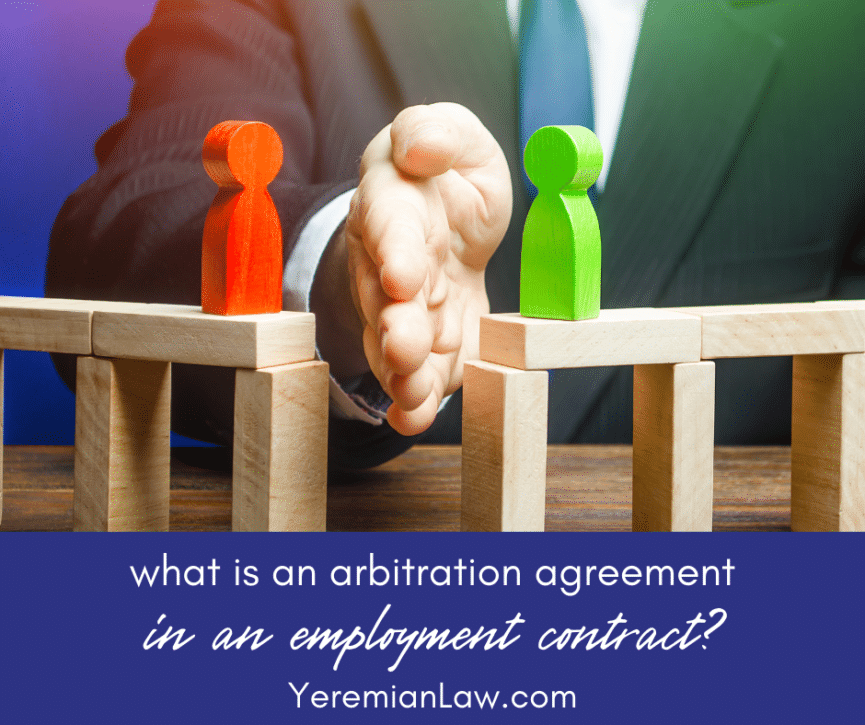In the state of California, employers are not allowed to force employees to sign a contract with an arbitration clause as a condition of employment. However, employers still use forced arbitration clauses, and employees still sign them. Here’s what you need to know.
In a 2-1 ruling in September 2021, the Ninth Circuit Court ruled that employers in California can face criminal and civil penalties for requesting employees and job applicants to agree to arbitrate future disputes. However, if the employer requests an employee or applicant to sign such an agreement and the employee or applicant does sign it, the statute doesn’t apply – and the employer isn’t subject to criminal or civil penalties.
Related: Independent contractor rights
The bottom line: If an employee or applicant refuses to sign such an agreement, the employer could be liable for criminal or civil penalties (or both). Gov. Gavin Newsom signed Assembly Bill 51 in October 2019, but a district judge granted a temporary restraining order that prevented it from going into effect; the September 2021 ruling lifted that order.
Related: What is the ABC test?
Why Could Forced Arbitration Be a Bad Thing?
Forced arbitration can be bad for workers. Essentially, a forced arbitration clause in an employment contract prevents an employee for coming after the employer for wrongdoing. Instead, the employee must use an arbitrator (and in some cases, the employee has no say in the matter) to find common ground with the employer. If you sign an agreement that says you agree to go to arbitration rather than to court, you’re waiving your right to get justice through the American legal system. You must instead go through an arbitrator. Unfortunately, arbitrators are usually beholden to the company that hires them – and that means you’re less likely to get a fair shake.
In fact, arbitration typically takes place behind closed doors. Everything about it is secretive, and you may even be asked to keep the content of your meetings confidential. You may not be entitled to the same discovery process as you would be in court, either. (Discovery is a phase of legal proceedings when you and the other party can seek disclosure of information that could help your case.)
Related: 5 federal employment laws that protect California workers
Why is Going to Court Better?
The National Employment Law Project estimates that forced arbitration clauses cost low-paid workers $12.6 billion in the year 2019 alone. That’s because many claims about requiring workers to perform duties while off the clock, minimum wage disputes, and failure to pay overtime are handled by mediators and arbitrators, not the court system – and because mediators and arbitrators have a financial interest in being hired again by the company, the case is less likely to work out in the employee’s favor.
Related: Is it illegal for employers to require you to work off the clock in California?
Do Most Employers Ask You to Sign Forced Arbitration Clauses?
Since AB 51, many employers are caught between a rock and a hard place – they don’t want to ask you to sign an arbitration clause in case you decline, because if you decline, they can be held criminally and civilly liable. However, some employers really, really want you to sign them; they know that if you have an issue with the company after you’re hired, you’ll have to keep it quiet so the public won’t find out.
Often, when an employer wants you to sign an agreement with a forced arbitration clause in it, the text will be buried in the fine print. As they say, though, the devil is in the details. You have the right to refuse to sign such an agreement as a condition of employment – and employers cannot force you. They can’t say, “Well, if you don’t sign, we won’t hire you.”
Do You Need to Talk to an Employment Lawyer About a Forced Arbitration Clause?
If you have an issue with your employer, we may be able to help you. Call our office at 818-230-8380 or fill out the form below to schedule a free consultation with an experienced attorney now.




